August 25, 2009
A Cockfight
By UON Seila
At dawn the eastern sky glows bright red from the sunrise. Birds sing,
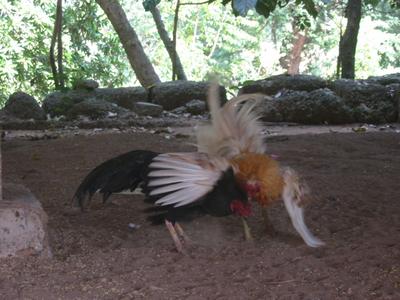
Photo by Wesley Tanaka
and trees sway in the gentle summer breeze from the south. A long, dusty trail winds through the countryside about eight kilometers off National Route One from Phnom Penh to Vietnam. It is 1967; a little peaceful village, Tong Neak, stretches along the trail.
As a farmer, I enjoyed country life very much. Every morning my favorite job was feeding the poultry. I took a bowl, scooped up grains of rice, and spread it in the yard in front of my house. Here come roosters, hens, ducks, drakes, and geese! How happily they cluck, crow, and quack as they eat their food! I liked to do this kind of job very much, and did not wait until my parents told me to do it. I especially loved the chicks.
As time passed, my chicks matured into cocks or roosters. One day I wanted to see my roosters fight each other, but they would not do so because they were siblings. They knew one another very well because they had grown up as a family. Then an old man living next door gave me an idea.
“Do you want to see your roosters fight each other?” he asked.
“I do; please help me,” I pleaded. As a boy living in the countryside with nothing to play with I wanted to play with something. So I decided to entertain myself by watching my roosters fight one another. “What can I do to get my roosters to fight each other?” I keep asking him.
He inquired, “Does your mother have a frying pan in your kitchen?”
“Yes, she does. I see it hanging up on the wall.”
“Go get a knife, scratch the black stuff from the frying pan, and apply it to the cheeks of the roosters you want to fight,” he instructed me.
Because I fed them every day, my roosters were so tame that I could catch them any time I wanted. So I began to make the sound I usually did when feeding them—Kru-u-u-u-u-uh! They recognized my sound and came closer to me as their friend. I took a bowl of rice grains, put some in my hand, and started to call my roosters. They came out of the bananas trees around the house. They came with a happy sound. They believed I was going to feed them again. I am sure some of them wondered why their master was calling them again. But others might not doubt at all, because they knew I was someone who fed them.
Finally I spotted two roosters that were similar in weight and height, so I took them in my hand. I start to rub the black stuff from my mother’s frying pan onto their cheeks. I rubbed one, then the other, and finally let them go. Before long they started to fight their own sibling with whom they had grown up in the same nest. They did not realize that the other was a sibling. They could not recognize the other any more because of the black stuff I put on their faces. They fought and fought an hour or so. Each was soon severely bleeding on its face.
The other animals stood in astonishment to see roosters from the same nest fighting one another. Pigs, dogs, ducks, and cats might wonder why their master did not help separate them. They did not know that I wanted to see them fight one another.
Soon the other boys from my neighborhood came to watch and shout with joy. They praised me for being so clever and providing them some exciting entertainment. Some of the boys helped wash one rooster from its bleeding. The fight kept on and on until neither bird could stand. Finally I decided to stop my game, because I was afraid that if my father came home and saw what I had done he might not be happy.
The next morning one of them was in a serious condition. It could not eat its food because of a cut on its beak. It stood under a banana tree like a man with malaria covered with blanket. When my father found out about the incident he was angry. He scolded me—not because we lacked chickens, but because he said we were Buddhist. He told me it is a sin to harm somebody’s life, even an animal’s life. We believe there will be life after death, and if we do something wrong in this life we will suffer its consequences in the next. He said that in the next life I will be fool, fight my brother, and suffer like the two cocks of mine.
To end their suffering my father had them killed and cooked as our food. He did that both to end the roosters’ suffering and to shorten my punishment in the next life (because the longer the roosters suffered, the longer I would have to suffer). I was frightened when I heard my father speak about hell. But if I behaved well, I would receive good things in my next life.
Thinking about how my roosters fought one another reminded me of Cambodia’s situation after more than two decades of war. We Cambodians have been like roosters raised in one nest, yet fighting our compatriots because we were painted either red (Khmer Rouge) or blue (Khmer Serei). The superpower from the free world painted us blue (calling us “Freedom Fighters”), while the superpower from the communist bloc painted us red (calling us “Khmer Rouge”).
Whether Khmer Rouge or Khmer Blue we are still Khmer—but we fought one another nearly two decades. In the end we all suffered and lost a great many of our own people. I remember that in my village of Tong Neak, all my relatives on my father’s side were Khmer Rouge, whereas all my relatives on my mother’s side were Khmer Blue—Lon Nol’s soldiers. They fought one another for five years. After the war both sides had perished. Not a single one of them was left.
In 1975 the Khmer Rouge exterminated the Khmer Blue by forcing them to work hard for little food. In a Khmer Rouge purge in 1978 all the eastern region (including Tong Neak) was butchered. But who gained and who lost? Cambodia lost.
Israel consisted of twelve tribes. They were brothers. But Israel was invaded by a powerful foreign country. Most of its people were taken away from their beloved homeland, while the remnants became another hatred group, the Samaritans, who were labeled as not pure Israelites.
In the Christian world we have been dyed red or blue, or smeared with soot from the frying pan, by various denominations. The soot dabbed on our faces from various denominations and sects has blinded us so that we do not recognize our own brothers and friends. Some groups warn their people, “Do not associate with that other group because they are not as holy as we are. Do not go with them—they speak in tongues, or they are very conservative, and we are not. Don’t participate in their seminar because they might entice you to join their group. Our group is better than theirs.” The list just goes on and on.
Who gains?-only the owner who feeds the roosters. He gains the pleasure being able to sit back and watch an exciting fight. But the losers are the cocks themselves, both of which end up as food for the owner.
Cambodians have lost in the recent past because they fought their own people. They hated their compatriots who shared the same land and the same country. I don’t want to see the history repeat itself. I want to break the cycle of crisis in Cambodia.
I don’t want to bite the hand that feeds our own people. But I want to plead with some foreign Christians from the outside. Let me repeat that I am talking about “some”—not “all”—of the missionaries from the outside. I neither wish to equate all missions nor single out any one of them, but just express my concern to those who forget that they are only guests in this land, not permanent residents. One day you will leave and start another field of mission in other part of the world. So I hope that you will not get upset when you read this article.
As a Cambodian I very much appreciate all missions from other parts of the globe that have come to start some kind of work in my country. What legacy will you leave behind when you depart? The spirit of unity or of disunity? Let the Cambodians themselves discern the differences between one group and another. Do not dye them so they do not recognize their own folk, as some world superpowers did to us in the past. I want to see my country delivered from the spirit of division after you, the spiritual giants, have left us.
Please play your role as best men and bridesmaids; don’t try to be the bride. The Cambodian church is a bride who will meet Jesus when he comes back, and will receive all the blessings and glory from him. The groom never comes to kiss the bridesmaid, but he will kiss the bride (the church), not missionary (bridesmaid). In the wedding the bride cannot do anything by her own; she really needs the bridesmaid to help her by holding umbrellas, or fanning her and massaging her leg while she sits in the ceremony for a long time. She really needs someone to help to ease her task. She knows her groom very well and how he feels, because they got to know one another during their dating. But the bridesmaids were simply asked to come to help in the wedding ceremony; they never knew the groom. Who knows the needs and the feelings of the Cambodian Church? I would say a Cambodian knows better than anybody else.
I remember one day I met with a Cambodian pastor. I am sorry I cannot mention his name. He said to me, “Only a Cambodian can understand the needs of the Cambodian. Even though some missionaries can speak our language fluently, or have lived in Asia for years and presumes he knows our culture very well, he still does not fully know what we need. A Cambodian would never voice some of his needs, but we Cambodians would know what they are without him having to say anything.” I would say he was right. In our culture people do not speak straightforward. We often do a little bit of beating around the bush. Therefore let the Cambodian reveal something to you over a period of time. Don’t quickly jump to a conclusion and say, “I know Cambodians very well.”
Again I want to apologize if I have written too strongly. My primary purpose was to try to reveal some of the feelings of our people with whom I have talked, and who have murmured their complaints.
Conclusion
- It is time to break the cycle of the spirit of division.
- Don’t criticize the nationals by blackening our faces for your own entertainment.
- We need partners, not colonizers, in the Christian community.
- Israel hated one another, fought one another like roosters, and Cambodians kill their countrymen, because of ideology from the outside.
- We Christians do not try to follow the pattern of the fallen world.[1]
- History will portray what you have done in this period of time.
- The earth is not our permanent place, and we never know our time of leaving the planet earth, so we don’t invest too much in building your own kingdom instead of God’s kingdom.
- God’s purpose is to take very different peoples and make them one in Christ Jesus—not have them fight one another or remain strangers.[2]
[1]Rom 12:2.
[2]Eph 2:19–21.
Written by: Cambodianchristian.Com
Filed Under: All, Articles, In English, Lesson
Trackback URL: http://www.cambodianchristian.com/article/wp-trackback.php?p=47
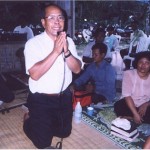



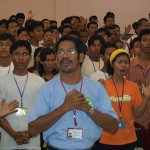
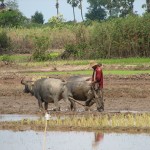
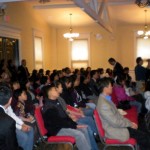
Amra
August 28, 2009 at 1:47 pm
Seila, great wirting. Fair and balance. I really appreciated!